|
Introduction
[background to Newton's printed pamphlet]
my Thoughts on Religious Associations
|
Since he had cried out to God for mercy during that storm at sea in 1748, Newton had been reading the Scriptures daily, struggling and praying to be more Christ-like, but feeling “like Elijah, I was ready to think I was in a manner serving my God alone”. [1] He had found “hardly any waters, any streams of Gospel communion and experiences” in those early years as a believer. |

Sandy Bay, St Kitts
where Newton and Clunie met |
Then, in May 1754, he met Captain Alexander Clunie in St Kitts. Within days, he found “my affections more lively, my graces more active and my evidences of assurance more clear than I ever yet attained to in my life.”
Clunie was the first Christian to sit alongside and carefully explain to Newton that he was justified by faith in Christ alone. He showed him how to study the Scriptures for his personal growth, encouraged him to pray aloud with others, and told him where he could find faithful teachers back in London. |
|
Up until then Newton had been able to speak of the “well-grounded confidence I had placed in the mercies of God through the merits of my Blessed Redeemer”, but now his understanding deepened markedly. “My life of late,” he recounted in a letter from St Kitts to David Jennings, “compared with what it was, has seemed a heaven upon earth, and I trust I shall have lasting, I may say indeed, everlasting, cause to bless God on his behalf.” |
|
Newton followed up Clunie’s suggestions of contacts in London. His taste for ‘religious associations’ were fired by the Christian fellowship he experienced through meetings with Samuel Brewer (1723-1796), Samuel Hayward (1718–1757), Samuel Pike (1717–1773), Richard Rawlins (1687-1757), William Romaine (1714-1795), Joseph Woolmer (1716-1782) [2] and others. Whenever he could travel up from his temporary home in Chatham, he attended their regular fellowship meetings.
ruins of Stepney Independent, Samuel Brewer's church
|
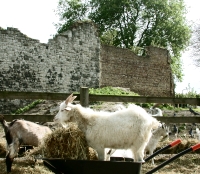 |
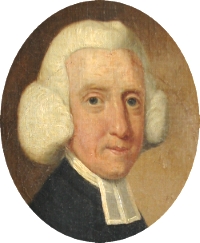
Joseph Woolmer |

"breakfasted with Mr Woolmer"

"we had much spiritual conversation" |
|
It was through Clunie, he gratefully recorded, that “I have been brought to converse with many more excellent Christians, who have been, I hope, of great use to me, and from a knowledge of my circumstances have been led to glorify God on my behalf. It is my judgement that societies formed on this view, will by divine blessing be abundantly useful, in promoting a spiritual and vital Godliness. I pray that I may always see it my duty to attempt the forming of such, or frequenting them when I have opportunity so to do.” |

15 February 1755
|
|
Some further illustrations of this period are given in the Introduction to Newton’s Eclectic Society notes. |
It was hard for him to leave such enriching fellowship behind when he took up his post as Tide Surveyor in Liverpool that August, but shortly afterwards (10 September 1755) George Whitefield arrived for a week. Newton took every opportunity of hearing him and enjoying his company.
“I find my frame rising again,” wrote Newton, “Particularly I prayed that this blessing the Lord has now sent the town may not be in vain.” |
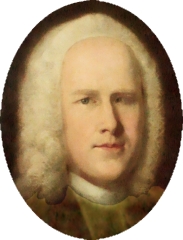
George Whitefield |
Newton spent time with Whitefield socially – “I went home and supped with him.”

“Who am I thus to be admitted into such company,” he reflected, “and yet what is this to the hope of admission into full communion with the saints in light?”
By the time Whitefield left Liverpool the following week, (15 September), Newton had been seen so frequently in his company that he had acquired the nickname ‘the little Whitefield’.
|
|
The Sunday after Whitefield’s departure, Newton went to the morning service at John Oulton’s chapel in Byrom Street: “Mr Whitfield recommended him as an excellent humble man.”
Diary, 21 September 1755
He called on Oulton the following evening and had “much satisfaction in his converse”. Oulton took him to visit another church member, where “the Lord gave me freedom of speech, and another opportunity of declaring his wonderful grace to the chief of sinners.”
|
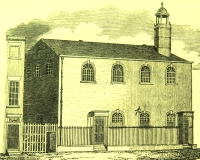
Byrom Street Chapel
(later St Stephen's) |
|
The “unusual friendly manner” of his reception that night caused Newton to pray: “Lord make me humble and thankful that thou art pleased to honour such a wretch with the regard and friendship of thy people. I was more pleased with these, as they seem to enjoy a catholic free spirit, and not bound up within the limits of a party as some here, and too many everywhere, are.
I desire to praise and to cultivate that faith which works by love
and to give my hand and heart to all that love the Lord Jesus.”
James Webb (c1707-1782), Independent pastor of Hitchen and then Fetter Lane, whom Newton had met several times in Chatham, had recently arrived in Liverpool. On Friday Newton heard Webb preaching, and “Afterwards went with him and others and spent the evening very comfortably and cheerfully…” He heard both Webb and Oulton preach on Sunday, and sought their fellowship again on Monday, when he spent “from 5 till near 10 … with Mr Oulton and Mr Webb with great pleasure”. |
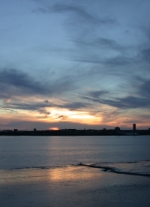
view from
the Watch House |
These encouraging meetings for fellowship were stirring up an idea in Newton’s mind. The next morning, he “Rose at 4, went to the Watch House, engaged in prayer, reading etc till past 6, then took a walk to plan and to pray over a thought which has been several times in my mind but particularly today, to endeavour to set on foot a religious society in this place.

The Lord direct my heart and tongue and pen for the glory of his name. I know the more I engage openly in the course of the gospel, the more obnoxious I am to spiritual pride – this is the great enemy I have to fear, but God is able to deliver me from it.” Tuesday 30 September 1755
|
 |
He mulled it over again the following morning: “Went early to the Watch House, had no interruption in my morning exercises; walked out, and thought farther of a plan for a society and began to commit it to writing.” Wednesday 1st October 1755 |
|
It was a day marked in history for more reason than one. A severe storm had struck: “two ships lost within sight of the town and several others in great danger.” Newton added, “These things ought to endear the Lord's goodness to me, in taking [me] out of that precarious life in which at times I have met with so many dangers, though always delivered and preserved.” |
|
The following day he “wrote more of my plan”. Polly’s health had improved and she was able to travel to join her husband in Liverpool. We hear no more of the ‘plan’ in his diary for the next three weeks, though it was clearly still much on his heart, for on Monday 24 November, he recorded: “Arose this morning something earlier and upon the whole had rather a better day than of late, engaged in leisure time copying my proposals for a society, to send to London.” |
 |
|
He finished them a couple of days later and sent them off to his friend Joseph Woolmer for feedback. |
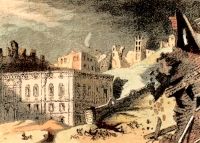 |
That week news came of a powerful earthquake in Lisbon “in which the accounts say three fourths of the city was destroyed either by the shock or by an eruption of flames from the earth which set the remaining buildings on fire, and 60 or according to others 100,000 people perished. Should the whole or any considerable part of this be true, with what deep concern and humiliation should the report of such an awful stroke be received amongst us… O may this sinful nation take warning.”
Lisbon earthquake of 1755 |
There is a lull again in his diary regarding the proposed society, which, amongst his other intentions, he acknowledges is “either for want of method in the disposal of my time, or want of resolution, or both”.
At the beginning of December, when news came “that a second shock had demolished much of what the former [earthquake] left standing”, it affected Newton deeply. “In prayer this morning was disturbed with the thought that I must publish something concerning the late earthquake – surely it was a delusion. Satan will willingly engage our thoughts about future duties if by that means he can draw us off from attending to present. This thought however warrantable in itself was a snare to me for I could not fix my mind in my devotions. Yet in the course of the day, I made some efforts to that purpose; but I fear I have neither style, method nor steadiness enough to go through with it; though I think I could do pretty well for matter.” |
|
His spare time was being spent chiefly in learning shorthand and Greek, as well as continuing correspondence “and some things I think I ought to write, but alas for want of a regular disposition they drive out another.” |

On Tuesday 9 December 1755, despite finding that the days were ‘flying swiftly’, Newton “Drew up an advertisement relating to the purposed society.”
|

home to the Newtons |
In late January 1756 the Newtons found a suitable house to rent. “I flatter myself it will be better with me when I have time and place at my own disposal; but unless the Lord is my helper, be my advantages more or fewer, I shall waste them all. It is not in externals but in my hard, wicked, deceitful heart, the evil lies. Lord to thee I look up, now O God strengthen my hands and help me to dedicate my house and all that is in it to thy service.” |
|
On his first full day in his new home, 24 January 1756, Newton wrote: “I endeavoured then and this morning by humble prayer to bespeak his presence and blessing with us in our new habitation, and in particular dedicated unto him a little room which I have set apart from a closet and a study – these two will not I hope interfere, for I will not be concerned in any reading or study more or less, which I cannot pray over, and from which I cannot hope, either motive or matter to quicken my prayers. |

As far as my business and relations will allow, I desire to devote myself wholly to the sanctuary, or sanctuary service. And though the Lord has not called and furnished me for the ministry which is an honour and privilege I should prefer to the possession of all the kingdoms upon earth, yet by the leisure, opportunities and influence he gives me, he certainly puts me in the way of being an instrument of service to his church. That I may be so, and consequently more enlarged and comfortable in myself, I pray that he would make me very careful in the disposal of my time, and help me to aim after a large attainment in self-denial, that I may be able to die daily and be crucified unto the world.
|

O Lord do thou undertake for me or I shall make no progress, gain no ground, now, more than heretofore, but if thou shalt be pleased to unlock my chariot wheels, to increase my faith, and to strengthen me with thy power, all things shall be possible unto me.”
|
|
On Friday 13 February he recorded that “the expectations of a war and perhaps an invasion increase every day”
Two related sermons on God’s judgment that weekend seemed to have revived in him a sense of urgency, for on Monday 16 February he was “from near ten till past eleven at the Watch House, employed in writing about the plan of a society.”

All the talk of the town was about “the impending war and invasion”. The Fast Day on 22 February had been appointed on account of the earthquake in Lisbon. Newton heard from Woolmer that large numbers in London had observed it with great solemnity. “O that conviction may go on [to] conversion with many that then outwardly humbled themselves before the Lord!” prayed Newton.
|
|
Finally, on Tuesday 2 March, he “began to copy for the press, some thoughts I have drawn up with regard to religious society.

“The alarm of an invasion still continues and frequent repetitions of shocks of earthquakes in different places, some having reached to our coasts. The plague likewise rages in the confines of Hungary and Poland, and war with all its horrors in many places, particularly (as most worthy our immediate notice) in North America. In the midst of these various distresses, happy England (happy si sua bona norint[1]) is preserved - safety, health, peace and plenty in all our borders.
O Lord put it in the hearts of thy people to pray earnestly for the prolonging [of] these mercies, especially for the continuance of our spiritual mercies, yea for our increase of them, that the gospel which is so brightly dispensed in particular places, may be dispersed and extended throughout the land to thy glory and our exceeding joy and comfort. Amen.”
|
On Thursday 4th March he says “wrote more of my paper”.
And on Thursday 8 April 1756:
“This day was chiefly busied in finishing and revising for the press, a piece of about a sheet, which I have had in hand about 4 months without heart to complete it.” |
|
Finally, on Friday 9 April 1756:

“Finished my essay and sent it to the press. I have now to guard against two evils that are opposite, which yet it is likely will join to disturb me: pride and shame. It should seemed there is but little to be proud of, but I expect the approbation of some good people may be a temptation – on the other hand I am exposed not only to the censure of the critics with respect to the style etc but to the blame of the zealots of all parties,
|
 |
to be thought an angry Enthusiast by some,
and a lukewarm temporiser by others.” |
|
“I trust the Lord will be my defence against both the right and left hand danger. Let me now remember that I have given bond as it were to the public for my behaviour. I have declared my hopes and principles in print and shall consequently have more eyes upon my conduct than ever.” |
“O for grace so to walk as I may give occasion to none to blaspheme the gospel cause on my account, but rather that beholding the uprightness and consistence of my life in all its parts, they may be constrained to glorify God on my behalf.
“And do thou Lord if it please thee, smile upon my poor attempt; make it a means of establishing a society of those who fear thy name, at least of stirring up someone more worthy and more skilful to take the design in hand.” |
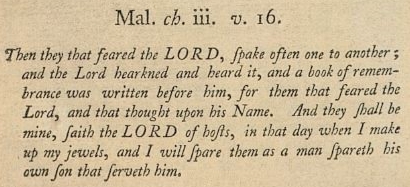 |
Saturday 10 April
“The morning taken up with writing a letter to Mr Brewer to accompany one of my papers which I intend to present him with.” |
|
Friday 16 April 1756


“Wrote to Mr Whitfield , Brewer and Hayward; sent the two latter one of my Thoughts on Religious Associations which came out of the press today.
|
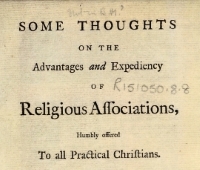 |
The full title of Newton’s publications was:
Some Thoughts on the Advantages and Expediency of Religious Associations,
Humbly offered To all Practical Christians.
This copy, published by John Sadler in Liverpool, is owned by Manchester University,
who have digitised it for general viewing online here.
|
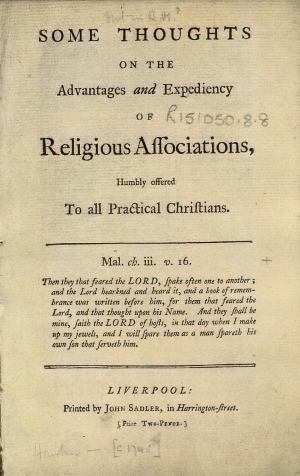 |
The pamphlet is anonymous and undated.
A suggestion of ‘1745?’ was once pencilled in, but the contents, style and language fit Newton’s diary so closely that it seems fair to assume these printed Thoughts on Religious Associations are the very same Thoughts on Religious Associations which he recorded in his diary were published on 16 April 1756. |
|
Saturday 17 April
 “Sent four of my papers to Mr JB [ John Breckell] [ 3[ with a letter upon the occasion
and ordered one to be sent to every Reverend Gentleman in town.”
 |
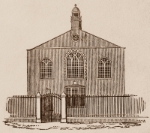
Kaye Street Chapel
minister John Breckell |
|
“Mem[o]: to make it a part of my daily prayers, that the Lord would be pleased to own this my poor desire, or that he would find some abler hands to work by, and in his own way revive his work in this place, where is so much ignorance, so many destroyed for lack of knowledge.” |
|
Monday 19 April
“My little paper which I only sent out this morning I find has already given an alarm to some, but if it please the Lord in any measure to bless it to my purpose I care not what they think or say. Defend me O Lord from the world and from myself, from pride and shame.” |
 |
Wednesday 21 April
“The forenoon various; distributed my books into the shops.”
Monday 10 May
“Had some converse with Mr J B_l[John Breckell], to whom I sent my books the 17th ult., and he gives me some hopes that it may in time be attended to. Lord, if thou shouldst please to work by so mean an instrument, it will manifestly appear to be thy own work.”
Tuesday 11 May
“In the forenoon conversing with several people abroad, the Revd Mr M[Thomas Maddock, vicar, St George's] and Mr B [Robert Brereton, perpetual curate St Nicholas], B_l [John Breckell] acknowledged the receipt of the books I sent them, in a manner which gives me more hopes of success.” |
Endnotes:
|
[1] |
O fortunatos nimium, sua si bona norint, agricolas! Virgil, Georgics II, line 258. “Oh how exceedingly happy the peasants would be could they but know their wealth”. In this context “if they only knew their advantages”. |
|
[2] |
Joseph Woolmer was a member of Old Gravel Lane Independent and subsequently of Stepney Independent. His sister Mary married Samuel Brewer, pastor of Stepney Independent. Woolmer married Elizabeth Hubbard, daughter of Brewer’s predecessor John Hubbard (d.1743).
Photo owned by Preb John Woolmer, direct descendant, 6th generation. |
|
[3] |
John Breckell (1697–1769), Presbyterian minister in Kaye Street, just around the corner from Newton’s home in Edmund Street |
Acknowledgements:
St Kitts photo: Nathaniel Horton. Taken at the opening of the Amazing Grace Experience
Joseph Woolmer portrait: Preb John Woolmer, direct descendant, 6th generation
'Some Thoughts on Religious Associations': Copyright of the University of Manchester, used under Creative Commons License
'Lisbon earthquake of 1755': Photograph. Encyclopædia Britannica Online. Web. 05 Nov. 2015.
John Newton Diary CO199, Princeton University, used by kind permission
|
Marylynn Rouse, 20/10/2015
|
|
|